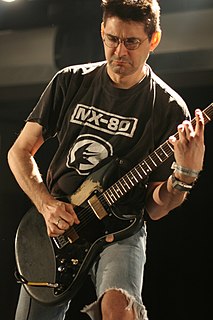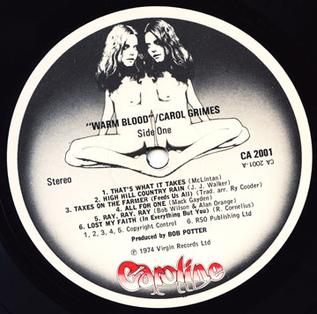Progressive punk may refer to:
- Neo-progressive rock: A genre of progressive rock influenced by punk rock and new wave.
- Post-progressive: Progressive rock that stems from sources other than prog.
- Progressive music#Progressive punk
Progressive punk may refer to:

Progressive music is music that attempts to expand existing stylistic boundaries associated with specific genres of music. The word comes from the basic concept of "progress", which refers to development and growth by accumulation, and is often deployed in the context of distinct genres, with progressive rock being the most notable example. Music that is deemed "progressive" usually synthesizes influences from various cultural domains, such as European art music, Celtic folk, West Indian, or African. It is rooted in the idea of a cultural alternative and may also be associated with auteur-stars and concept albums, considered traditional structures of the music industry.
Rock music is a broad genre of popular music that originated as "rock and roll" in the United States in the late 1940s and early 1950s, developing into a range of different styles in the mid-1960s and later, particularly in the United States and the United Kingdom. It has its roots in 1940s and 1950s rock and roll, a style that drew directly from the blues and rhythm and blues genres of African-American music and from country music. Rock music also drew strongly from a number of other genres such as electric blues and folk, and incorporated influences from jazz, classical, and other musical styles. For instrumentation, rock has centered on the electric guitar, usually as part of a rock group with electric bass, drums, and one or more singers. Usually, rock is song-based music with a 4
4 time signature using a verse–chorus form, but the genre has become extremely diverse. Like pop music, lyrics often stress romantic love but also address a wide variety of other themes that are frequently social or political.
Progressive rock is a broad genre of rock music that developed in the United Kingdom and United States throughout the mid- to late 1960s, peaking in the early 1970s. Initially termed "progressive pop", the style was an outgrowth of psychedelic bands who abandoned standard pop traditions in favour of instrumentation and compositional techniques more frequently associated with jazz, folk, or classical music. Additional elements contributed to its "progressive" label: lyrics were more poetic, technology was harnessed for new sounds, music approached the condition of "art", and the studio, rather than the stage, became the focus of musical activity, which often involved creating music for listening rather than dancing.
Alternative country, or alternative country rock is a loosely defined subgenre of country rock, which includes acts that differ significantly in style from mainstream country music, mainstream country rock, and country pop. Alternative country artists are often influenced by alternative rock. However, the term has been used to describe country music bands and artists that are also defined as or have incorporated influences from alternative rock, heartland rock, Southern rock, progressive country, outlaw country, neotraditional country, Texas country, Red Dirt, honky-tonk, bluegrass, rockabilly, psychobilly, roots rock, indie rock, hard rock, folk revival, indie folk, folk rock, folk punk, punk rock, cowpunk, and rhythm 'n' blues.

A metal umlaut is a diacritic that is sometimes used gratuitously or decoratively over letters in the names of hard rock or heavy metal bands—for example, those of Blue Öyster Cult, Queensrÿche, Motörhead, the Accüsed, Mötley Crüe and the parody band Spın̈al Tap.

Math rock is a style of progressive and indie rock with roots in bands such as King Crimson and Rush as well as 20th-century minimal music composers such as Steve Reich. It is characterized by complex, atypical rhythmic structures, counterpoint, odd time signatures, angular melodies, and extended, often dissonant, chords. It bears similarities to post-rock.

Caroline Records is a record label originally founded in 1973. Initially founded in the United Kingdom to showcase British progressive rock groups, the label ceased releasing titles in 1976 and then re-emerged in the United States in 1986 to release the work of American punk, post-punk, and alternative rock bands. Caroline has or had a number of subsidiary labels including Astralwerks, Gyroscope, Caroline Blue Plate, Beat the World, Scamp, and Passenger.
Avant-garde music is music that is considered to be at the forefront of innovation in its field, with the term "avant-garde" implying a critique of existing aesthetic conventions, rejection of the status quo in favor of unique or original elements, and the idea of deliberately challenging or alienating audiences. Avant-garde music may be distinguished from experimental music by the way it adopts an extreme position within a certain tradition, whereas experimental music lies outside tradition.
Popular music of the United Kingdom in the 1970s built upon the new forms of music developed from blues rock towards the end of the 1960s, including folk rock and psychedelic rock. Several important and influential subgenres were created in Britain in this period, by pursuing the limitations of rock music, including British folk rock and glam rock, a process that reached its apogee in the development of progressive rock and one of the most enduring subgenres in heavy metal music. Britain also began to be increasingly influenced by third world music, including Jamaican and Indian music, resulting in new music scenes and subgenres. In the middle years of the decade the influence of the pub rock and American punk rock movements led to the British intensification of punk, which swept away much of the existing landscape of popular music, replacing it with much more diverse new wave and post punk bands who mixed different forms of music and influences to dominate rock and pop music into the 1980s.
The Mob may refer to:
Gaza may refer to:
Art punk is a subgenre of punk rock in which artists go beyond the genre's rudimentary garage rock and are considered more sophisticated than their peers. These groups generated punk's aesthetic of being simple, offensive, and free-spirited, in contrast to the angry, working-class audience generated by pub rock.
Punk or punks may refer to:
Math metal may refer to:
Pell Mell may refer to:
Electronic rock is a music genre that involves a combination of rock music and electronic music, featuring instruments typically found within both genres. It originates from the late 1960s, when rock bands began incorporating electronic instrumentation into their music. Electronic rock acts usually fuse elements from other music styles, including punk rock, industrial rock, hip hop, techno, and synth-pop, which has helped spur subgenres such as indietronica, dance-punk, and electroclash.